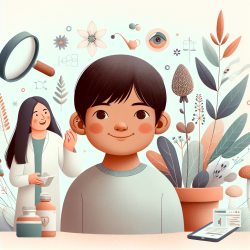Otitis media with effusion (OME) is a common condition affecting nearly every child at least once, with about 90% of children experiencing an episode before school age. Traditional treatments, such as antibiotics and steroids, have shown limited efficacy and are often accompanied by undesirable side effects. However, recent research has highlighted the potential benefits of herbal medicines in treating OME. This blog post will explore how speech-language pathologists and other practitioners can leverage these findings to improve outcomes for children.
Understanding Otitis Media with Effusion
OME is characterized by the presence of fluid in the middle ear without signs of acute infection. Persistent and untreated OME can lead to significant functional limitations, such as permanent hearing loss, delayed language, speech, and cognitive development. The high prevalence and potential complications of OME pose significant socioeconomic consequences, including loss of income and time for caregivers and children, as well as medical costs.
The Promise of Herbal Medicines
The systematic review titled "Oral administration of herbal medicines for the treatment of otitis media with effusion: protocol for a systematic review" conducted an extensive, unbiased search of various databases without language restrictions. The study aimed to assess the safety and efficacy of herbal medicines in treating OME. Here are some key takeaways:
- Herbal medicines have shown immunomodulatory properties and anti-inflammatory efficacy in clinical research.
- Experimental research indicated that herbal medicines reduced swelling and prevented endotoxin-induced otitis media through stimulating the mucociliary system for pathogen clearance.
- Many herbal medicines exhibited anti-inflammatory and antibacterial effects in otitis media animal models.
Implementing Herbal Medicine in Practice
Given the promising results, practitioners should consider the following steps to incorporate herbal medicine into their treatment plans:
- Stay Informed: Continuously review the latest research on herbal medicines and their applications in treating OME.
- Collaborate with Experts: Work with herbal medicine specialists to understand the appropriate usage and dosage of herbal treatments.
- Educate Patients and Caregivers: Inform families about the potential benefits and safety of herbal medicines as an alternative or complementary treatment to conventional methods.
- Monitor Outcomes: Keep detailed records of patient progress and any side effects to contribute to the growing body of evidence supporting herbal medicine use.
Encouraging Further Research
While the findings are promising, the systematic review also highlighted potential limitations, such as publication and location bias, poor quality of primary data, and incomplete evidence. Practitioners are encouraged to participate in and support further research to solidify the understanding of herbal medicines' efficacy and safety in treating OME.
Conclusion
Herbal medicines offer a promising alternative for treating otitis media with effusion, potentially reducing the need for conventional treatments that come with side effects. By staying informed and collaborating with experts, practitioners can improve outcomes for children suffering from OME. To read the original research paper, please follow this link:
Oral administration of herbal medicines for the treatment of otitis media with effusion: protocol for a systematic review.










